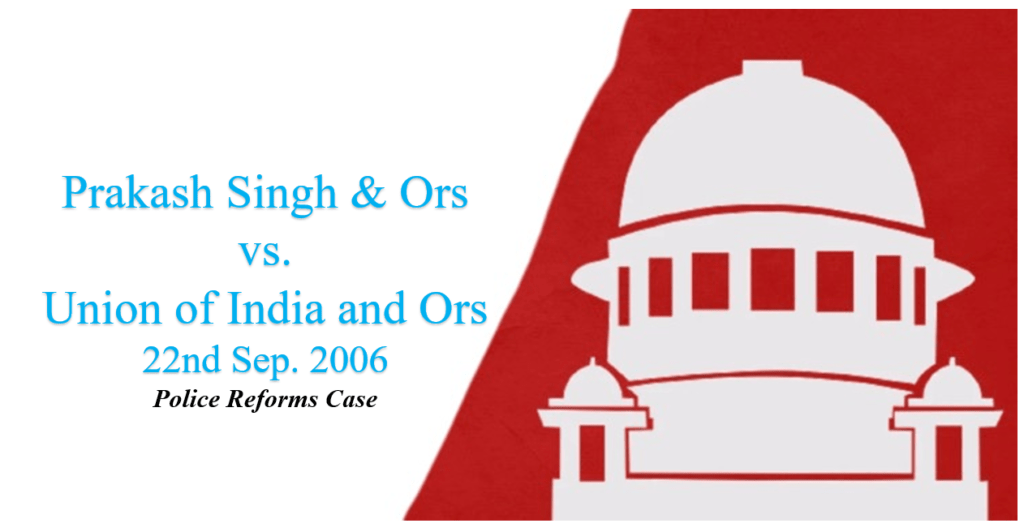
| Case Name : | Prakash Singh & Ors.vs. Union of India and Ors. |
| Equivalent citation: | Writ Petition (civil) 310 of 1996 |
| Date of Judgement: | 22/09/2006 |
| Court : | The Supreme Court of India |
| Case No: | Writ Petition (civil) 310 of 1996 |
| Case Type : | Civil |
| Petitioner: | Prakash Singh |
| Respondent: | Union of India |
| Bench: | Y.K. Sabharwal, C.K. Thakkar & P.K. Balasubramanyan |
Relevance–
In this case the Supreme Court issued seven binding directions on the police reforms. Supreme courts views behind these directions is that to develop the police in the political, social and economic status. As Police is the law enforcing agency in India. So, it is essential to have the reforms for their empowerment. Prakash Singh initiated these issue of police reforms by the writ of mandamus.
FACTS
- In 1966, Prakash Singh, petitioner, the former DGP of Uttar Pradesh, filed a writ petition in the Supreme Court under Article 32 of the constitution asking for the issue of directions to Government of India to frame the new Police Act on the model Act drafted by National Police Commission in order to ensure that the police is made accountable primarily to law of the land as according to Article 14 – No one is above the law.[1]
ISSUE RAISED
Whether the Police reform is the necessity of the Indian society to not?
ARGUMENTS
As petitioners contended that the present distortions and aberrations in the functioning of the police have their roots in the Police Act of 1861.So, the immediate need is the change the scope and functions of police for bringing the accountable nature according to the NPC recommendations.
JUDGEMENT
Supreme Court read over various reports and to discharge the constitutional duties and obligations issued the following 7 directions:-
1) Constitute a State Security Commission on any of the models recommended by various committees and commissions.
2) The Director General of Police shall be elected from amongst the three senior- most officers of the department having the good rank by the UPSC etc.
3) Prescribe a minimum tenure of two years to the police officers on operational duties.
4) The investigating police shall be separated from the law and order, police to ensure speedier investigation and better expertise.
5) There shall be police establishment board in each state which shall decide all working conditions related to police officers.
6) There shall be constituting of Police Complaints Authorities at the district level.
7) The Central Government shall also set up a National Security Commission at the Union level who should also be given a minimum two years tenure. [2]
CONCLUSION
Seven directions by Supreme Court proves to be betterment of the Police reforms if it good enforcement process. After these directions 18 states passed or amended their police reforms in this time, but not as same as legislative models.
[1] Indian Kanoon https://indiankanoon.org/doc, last seen on 6th April,23
[2] IAS Baba, https://iasbaba.com/2021, last seen at 7th April,23
Written by: Harshita Sharma, Barkatullah University, Department of Law, Bhopal.




0 Comments